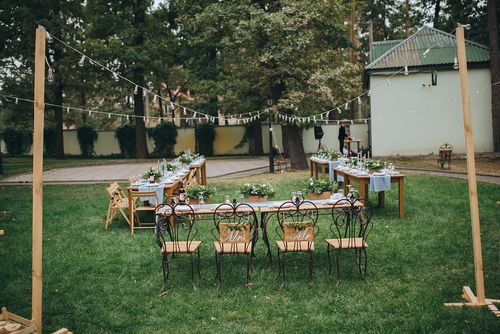 What do you do when a small backyard wedding with only 50 guests balloons into a full-blown affair with 90 people, a professional DJ, and hours of dancing? American newspaper columnist Amy Dickinson was posed this very question by a frustrated reader who’d agreed to let her niece use her home for a wedding. With wedding costs averaging $38,700 in 2019, many couples look for inexpensive venue alternatives. But when do you bite the bullet and rent a venue instead of hosting at home? Answering that question involves research, analysis, and considering priorities for your big day.
What do you do when a small backyard wedding with only 50 guests balloons into a full-blown affair with 90 people, a professional DJ, and hours of dancing? American newspaper columnist Amy Dickinson was posed this very question by a frustrated reader who’d agreed to let her niece use her home for a wedding. With wedding costs averaging $38,700 in 2019, many couples look for inexpensive venue alternatives. But when do you bite the bullet and rent a venue instead of hosting at home? Answering that question involves research, analysis, and considering priorities for your big day.
As Costs Rise, Couples Seek Alternatives
Finding a great venue is important when you’re hosting a wedding. As one of the first things on a planning to-do list, it also takes up a significant portion of most couples’ budgets. Wedding Wire’s 2019 report revealed that 86% of nearlyweds hired a venue, which with catering accounted for about 40% of their total expenses. That’s a large chunk of change whether you’re spending $2,000 or $72,000.
If funds are limited or you don’t feel like going into the red to tie the knot, you may look for cheap or free locations. This cost-cutting tip is commonly suggested by experts such as The Motley Fool’s Selena Maranjian. For some nearlyweds, a friend’s or relative’s backyard is an inexpensive alternative. Maybe it holds special memories, offers plenty of space, or has the perfect atmosphere for a celebration.
With Your Wedding Location, Size Matters
Your childhood home may have a special charm, but can it host your wedding? Having plenty of room is critical. The Knot suggests between six and 10 square feet of ground space for each guest when it comes to seating. That works out to a maximum of 1,300 square feet for a guest list of 130, and that’s not including your dining area and dance floor. You’ll also need several other elements to make your space wedding-ready:
- Tables and chairs
- Dinnerware and barware
- Linens, place settings, and napkins
- Outdoor tents
- Portable restroom facilities
Your energy requirements will increase, so you’ll likely need to rent a generator to handle the extra power load. The property must also have enough space to accommodate the generator.
Preparation Is Key to a Successful Backyard Wedding
Bridal Guide blogger Katherine Swenson describes how she and her husband Ian hosted their backyard wedding at their Arizona home. Swenson explains that they had enough room for their 130 guests, but getting their yard ready required some extra prep, such as chairs and table rentals and extra lighting. They also had to ensure they provided enough parking and didn’t run afoul of noise and nuisance laws. Safety was another vital concern, especially with belligerent bees in their yard.
Other key considerations include the condition of your lawn, any uneven ground in your yard, the additional help you should hire, and obtaining the necessary permits from your location. Even with a permit, you could contend with noise ordinances that restrict how late you can play loud music. Swenson comments that they didn’t spend less overall on their backyard nuptials than with a traditional venue, but they were able to better apportion their funds and spend money on what they considered most important.
Feasibility Involves Costs, Space, and Logistics
Backyard weddings can be magical, but they aren’t always feasible. When replying in her advice column, Amy Dickinson recommended that the frustrated reader’s niece host her wedding elsewhere. That was a sound suggestion, given the scope of the celebration and the potential concerns over noise and space. These, plus costs and location suitability, are key considerations when you’re planning a wedding at home, no matter if it’s in your backyard or someone else’s.
Add Your Comment